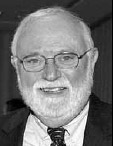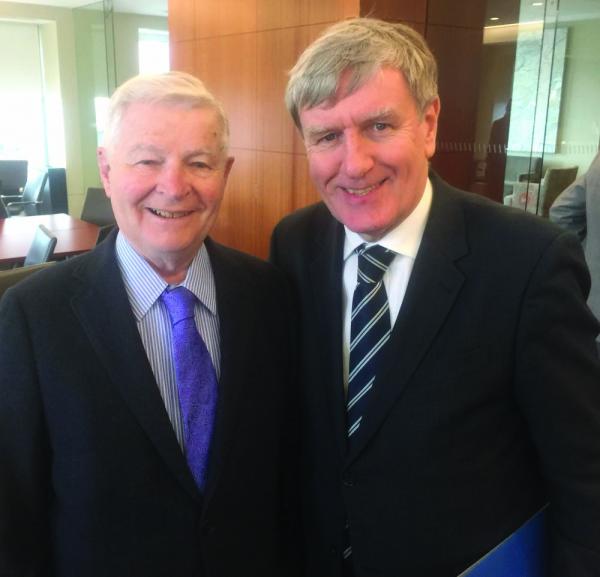
April 27, 2018

Ireland’s Ambassador to the United States, Daniel Mulhall, visited Boston last month for an evening function at the Boston College Club and a noon time class with students at Tufts University. During his brief overnight visit, Mulhall was a guest breakfast speaker at the Nutter law offices hosted by attorney Bill Kennedy.
The ambassador was assigned to Ireland’s Washington embassy last August, after four years as envoy to London. A graduate of University College Cork, the Waterford native has also headed Ireland’s embassies in Germany and Malaysia.
With a master’s degree in modern Irish history, Mulhall is known for his strong support of Irish culture and the arts. I began to follow him on his Twitter account @DanMulhall last year, where he cites Irish poetry every day. After his remarks at the law firm, I asked him about his daily poetry posts.
“I usually bring a slim volume of poems with me wherever I travel,” he told me, stepping away from the podium to retrieve his smart phone. “I got home last night from a great Boston College event. I was a bit tired but I managed to find a nice quote from Seamus Heaney.”
As it happened, his visit that day, April 13, was on the late Nobel laureate’s 79th birthday. “Today I brought a few lines from Seamus Heaney, one of the great Irish poets,” he said, then he read aloud a verse from the 2010 book “Human Chain”:
“I was there.
Me in place and the place in me.
Where can it be found again,
An elsewhere world, beyond
Maps and atlases,
Where all is woven into
And of itself, like a nest
Of crosshatched grass blades?”
“The reason I do this is, first of all, I think one of the great glories of Ireland is the fact that that we have a strong literary heritage; we lost our own language in the 19th century but we grew a new language, which is our own version of English. It’s turning the tables on our nearest neighbors, by sort of colonizing their language and making it our own.
“I always say that you can make a very good argument that in 20th-century literature the greatest poet is W. B. Yeats in English; the greatest novelist, James Joyce; the greatest dramatist either Sean O’Casey or Samuel Beckett, and they would be very good contenders.
“In the case of Yeats and Joyce it could be a slam dunk. They could be a guaranteed winner; in the case of O’Casey and Beckett, now there may be some argument about the other two, but they’d give it a good shout—they’d be in the running, they’d be neck and neck with whoever it is that might be up against them. But the Irish literary heritage gives us a foothold in the world that we couldn’t otherwise hope to enjoy.”
He recalled that some years ago he was invited to lunch with an Indian woman of distinguished heritage, who, when she learned he was Irish, recited Yeats’s great poem “The Lake Isle of Innisfree.”
“She knew Yeats by heart,” he said. “I asked her where did you learn it; she said, ‘I was interred by the British with my brothers in the 1930s and we learned it and have never forgotten it.’
“That’s a big advantage for Ireland – that the most influential family in India knows that literature by heart,” said Mulhall. “That’s an asset that we should hang onto, wouldn’t you say?
Mulhall seemed to enjoy telling the audience of 40 business persons about his daily poetry tweets. “I send out a poem every morning to remind people about the Irish literature heritage. I get lots of positive reactions to my poetry tweets, that’s why I am going to keep them going.

